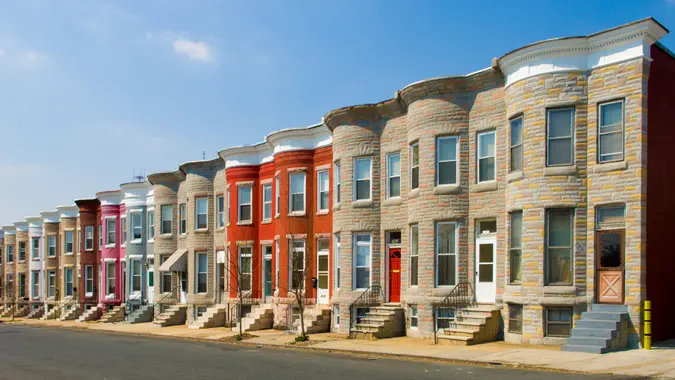Biweekly Mortgage Payments: How To Save Thousands

Commitment to Our Readers
GOBankingRates' editorial team is committed to bringing you unbiased reviews and information. We use data-driven methodologies to evaluate financial products and services - our reviews and ratings are not influenced by advertisers. You can read more about our editorial guidelines and our products and services review methodology.

20 Years
Helping You Live Richer

Reviewed
by Experts

Trusted by
Millions of Readers
High mortgage rates are a reality for homebuyers, but there are ways to ease the pinch. One is a repayment strategy called biweekly mortgage payments. With a small additional investment up front and slightly more over the course of the year, you can pay your loan off several years early and save tens of thousands of dollars in interest.
Check Out: 4 Genius Things All Wealthy People Do With Their Money
What Are Biweekly Mortgage Payments?
Biweekly payments are monthly mortgage payments you pay once every two weeks. Each payment equals half of your regular monthly payment amount.
The term can be confusing because the word “biweekly” can also mean two times a week. However, in the context of mortgage terminology, the phrase “biweekly payments” always refers to payments you make once every two weeks.
How Do Biweekly Mortgage Payments Work?
Biweekly mortgage payments break your monthly payment into two payments made two weeks apart. This every-14-day schedule results in an extra payment each year, so you pay off your loan faster and with less interest.
To understand how it works in more detail, it also helps to understand how interest accrues on your loan, and how lenders apply payments to borrowers’ principal and interest — a process called amortization.
Every time you make a mortgage payment, the lender applies some of it to the loan principal and some to the interest that has accrued on that principal. Your principal balance is higher at the beginning of the loan term, so it accrues more interest. As the principal balance gradually decreases, the accrued interest decreases, too, so more of your payment goes toward the principal. Whereas almost all of your payment goes toward interest in the first year, almost all of it goes toward the principal by the last year.
When you make mortgage payments every two weeks and the lender credits them every two weeks, you accelerate your amortization, or payoff, and compound the interest savings. That means you don’t simply finish paying 30 months early if you begin biweekly payments when you first buy a home and start paying a 30-year mortgage. Your loan will actually be paid off more than six years early.
Here’s how biweekly payments compare to monthly payments on a hypothetical $400,000 30-year fixed-rate mortgage with a 7% interest rate. The monthly payment for that loan would be $2,661.21, and each biweekly payment would be half that amount, or $1,330.61.
| End of Year | Principal Balance With Biweekly Payments | Principal Balance With Monthly Payments |
|---|---|---|
| 1 | $393,079.13 | $395,936.76 |
| 5 | $360,028.68 | $376,526.36 |
| 10 | $303,401.03 | $343,249.53 |
| 15 | $223,176.25 | $296,075.46 |
| 20 | $109,521.26 | $229,200.31 |
| 24 | $0 | $156,091.79 |
In order for biweekly payments to work this way, the lender must apply the payments as you make them. Not all do, which proves disappointing to borrowers who realize too late that their biweekly payments provided little or no interest savings.
For example, PNC Bank, similar to other banks, requires borrowers to make a double payment in the month before they start paying biweekly. Then, as it collects half payments, the lender holds the first one each month in a non-interest-bearing account until the borrower pays the second half, at which time both halves are credited. In effect, you’re loaning money to the lender until you make the second half of your payment.
If your lender works the same way, you’ll be a payment ahead because of the double payment made up front, and you’ll make an extra payment each year. But you won’t reap the full benefit of the early principal payments.
PNC compensates for that by applying a half payment directly to the principal balance two times per year. Your lender might do something similar, but the only way to tell how much that helps, if at all, is to compare the amortization schedule for that payment arrangement against schedules for monthly payments and other repayment strategies.
How Much Can You Save With Biweekly Mortgage Payments vs. Monthly Payments?
The amount you can save depends on your loan size and when you start making biweekly payments — the earlier the better because your principal balance, and thus accrued interest, are higher in the early years of the loan.
Using the previous example of a $400,000 loan, here are the savings you could expect from biweekly payments starting at various points in the 30-year loan term. It assumes that the lender applies the payments biweekly:
| Biweekly Payments Begin | Interest Savings |
|---|---|
| At beginning of mortgage term | $137,850.57 |
| End of Year 5 | $88,262.52 |
| End of Year 10 | $51,813.02 |
| End of Year 15 | $26,703.44 |
| End of Year 20 | $10,945.25 |
| End of Year 25 | $2,612.69 |
Benefits and Risks of Biweekly Mortgage Payments
Paying your mortgage biweekly instead of monthly has clear benefits. However, it’s important to also consider potential risks before you make changes to your loan repayment schedule.
Benefits
- You’ll make an extra mortgage payment each year, which pays your loan off faster.
- The interest savings can amount to tens of thousands of dollars, depending on when you begin paying biweekly.
- Biweekly payments are a relatively painless way to accelerate your mortgage payoff.
Risks
- Your lender might be unwilling to credit biweekly payments to your account. In that case, you’ll still benefit from the double payment before starting the biweekly payments and the extra payment each year, but you won’t benefit from paying half of your mortgage payments early.
- If your loan has a prepayment penalty, early repayment will reduce, and could eliminate, any savings you might gain from paying your loan off early.
- Some lenders charge fees for biweekly payment processing. These fees can be higher than your interest savings.
- The money that goes into the extra mortgage payments is unavailable for other uses, such as to pay off other debt, invest or build an emergency fund.
How To Set Up Biweekly Mortgage Payments
If you’re wondering how to make biweekly mortgage payments, you’ll need to follow these steps:
- Confirm that your lender credits biweekly payments as it receives them, without any fees, and that there’s no prepayment penalty. If any of these is untrue, reconsider whether biweekly payments make sense for you.
- Sign up for biweekly payments with the lender.
- The month before you begin paying biweekly, make two full mortgage payments — you must be a month ahead to change to a biweekly payment schedule.
- Agree to have the lender automatically debit the payments from your bank account.
- Once the biweekly payments begin, check your mortgage statements to make sure they’re being applied correctly.
Alternative Ways To Pay Off Your Mortgage Faster
Biweekly payments aren’t the only way to pay off your mortgage early, and they might not even be the best way. In addition to weighing the pros and cons of biweekly mortgage payments, you can also consider employing one or more of the following strategies:
- Make an additional principal payment with each mortgage payment. Be sure to designate the extra payment as a principal payment, and check to make sure the lender applies it that way.
- Make an extra mortgage payment each time you get a cash windfall, such as a tax refund or employee bonus.
- Refinance your mortgage into a 10-year or 15-year loan. Remember that you’ll pay closing costs, whether they’re specified as such or the lender charges a higher rate to offer no-closing-cost loans. Include those costs in your calculations to make sure they don’t eliminate the benefits of early repayment.
FAQ
Making biweekly mortgage payments can mean paying extra money toward your principal that otherwise could go to other uses. Here's more information to help you decide whether it's worth it.- Is making biweekly mortgage payments a good idea?
- Making biweekly mortgage payments can be a good idea, especially if the lender applies the payments as you make them.
- How much faster do you pay off a mortgage with biweekly payments?
- That depends on when you start making the biweekly payments. If you start right from the beginning of your 30-year mortgage loan, you can pay off your mortgage about six years early.
- How many years does making biweekly payments knock off of a 30-year mortgage?
- If you start biweekly payments in the first month of your mortgage loan, you'll have your loan paid off about six years early.
- What is a bimonthly mortgage payment vs. a biweekly mortgage payment?
- A biweekly mortgage is one you pay every two weeks, for a total of 26 half payments, or 13 full payments, per year. A bimonthly mortgage is one you pay twice a month, for a total of 24 half payments, or 12 full payments, per year.
- How can I pay off my 30-year mortgage in 10 years?
- You can make extra principal payments if your lender allows it and you have no prepayment penalty. Use a mortgage calculator, like the extra payments calculator provided by Freddie Mac, to figure out how much extra you need to pay, and how frequently to make extra payments, to pay off your loan in 10 years. If the lender doesn't allow extra payments, you can refinance your current loan into a 10-year mortgage. However, it's a good idea to run the numbers through a refinance calculator first to see how closing costs affect your interest savings.
- What happens if I pay two extra mortgage payments a year?
- Two extra mortgage payments per year will pay off your loan faster and save you on interest. How fast and how much depend on how far you are into your loan.
- Is it worth paying off a mortgage early?
- It can be, depending on how far into your loan you begin making extra payments, and whether the extra money you put into your mortgage would generate a better return for you.
Our in-house research team and on-site financial experts work together to create content that’s accurate, impartial, and up to date. We fact-check every single statistic, quote and fact using trusted primary resources to make sure the information we provide is correct. You can learn more about GOBankingRates’ processes and standards in our editorial policy.
- Freddie Mac. "Understanding amortization."
- Consumer Financial Protection Bureau. 2024. "Is there such a thing as a no-cost or no-closing cost loan or refinancing?"
- Chase. "Monthly vs biweekly mortgage payments."
- Rocket Mortgage. 2024. "Biweekly Mortgage Payments: Are They A Good Choice For You?"
 Written by
Written by  Edited by
Edited by 

























